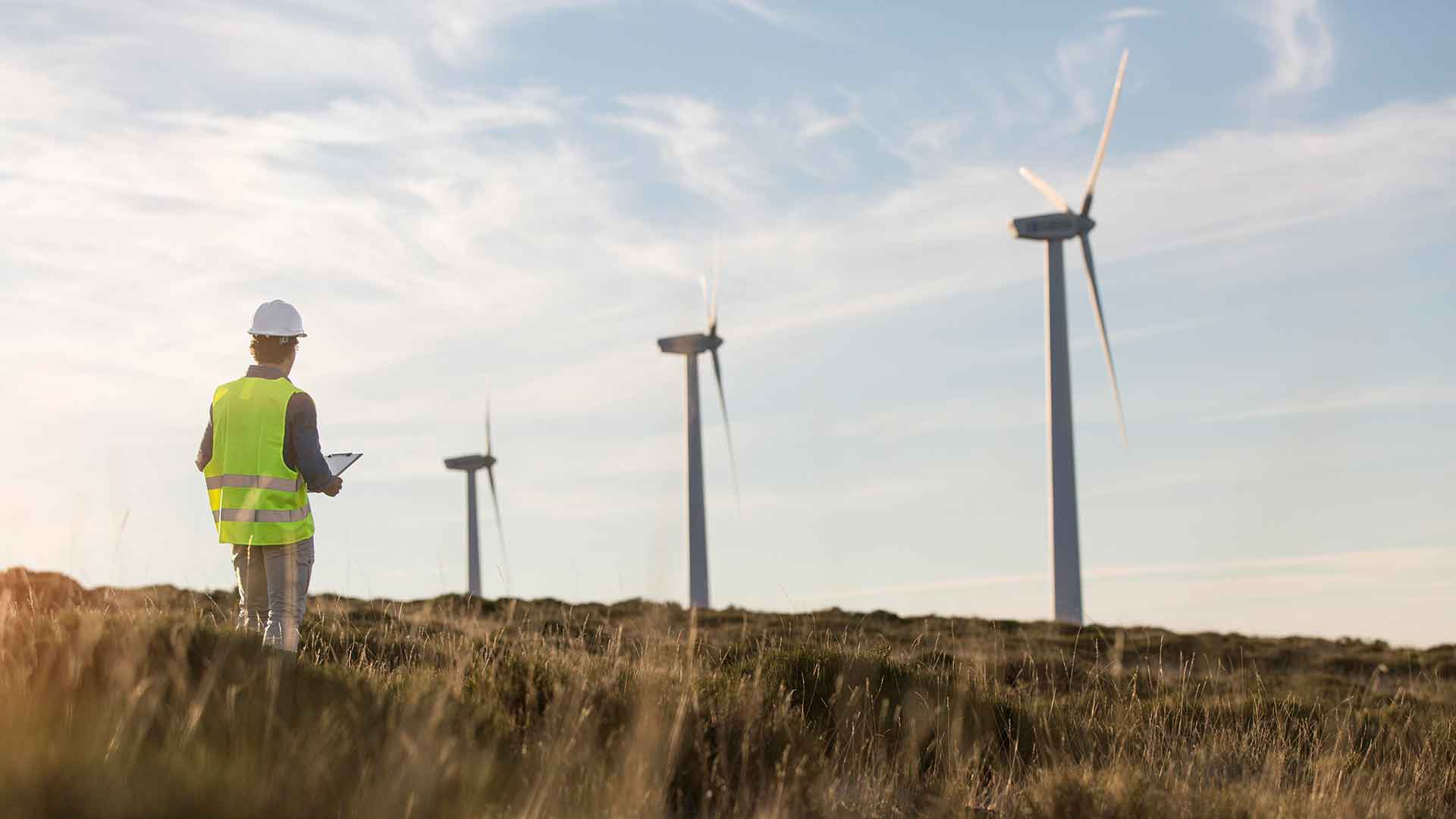Green engineer and renewable energy engineer are jobs you may have heard of that contrast engineering with traditional fossil fuel energy. Under that umbrella are many different jobs, sometimes with seemingly overlapping titles.
Some renewable energy engineers focus on producing energy from renewable technology, while solar engineers specialize in aspects of solar energy.
Many jobs focus on creating systems for specific areas of energy production to leverage the power of renewable energy sources.
Are you looking to start school? Have you just finishing school as a renewable energy engineer? Or are you just curious about switching careers? Let’s explore renewable energy engineering as a career and see if it might be the job for you.
What Does a Renewable Energy Engineer Do?
A renewable energy engineer is responsible for the technical aspects of renewable energy systems such as solar panels, dams for hydroelectric power, and wind turbines.
They use engineering principles, methods, and processes to minimize environmental impact and streamline operations.
Although every solar or hydroelectric site is different, the aim is always to make the area run as efficiently as possible. Often these engineers will focus on making panels and turbines for utilities and governments into carbon-free power sources.
Although not an exhaustive list, on any given day, a renewable energy engineer may be asked to:
- Perform site visits
- Assist with planning upgrades to plants
- Use materials and energies in new ways
- Test a new type of solar panel to ensure it is both powerful and affordable
- Liaison with the community
- Complete educational work with environmental technicians
A Day at Work for a Renewable Energy Engineer
With such a long list of responsibilities and no typical day for any engineer, the daily work of a renewable energy engineer will vary greatly depending on who they work for and how tasks are shared among employees. However, some tasks are universal in the profession.
Research and Making a Plan
The first steps when creating renewable energy systems are researching, designing, and planning how the technology will work and its use cases. Renewable energy engineers specialize in translating solar, wind, and hydroelectric power into usable forms.
By collecting and analyzing data from field experiments, they can find trends and variations to help them develop new technologies.
These technologies could be new structures to elevate and protect installations or coating materials to improve energy management from wind farms and solar sites.
While building new and innovative technologies is always important, maintenance and small changes are also key.
Junior and Senior Engineering Duties
A renewable energy engineer’s daily work is usually divided between fieldwork and office work, with occasional trips to see energy sites like wind and solar farms or to visit clients at their business.
Many companies will split engineering tasks and allocate them to junior and senior engineers based on education and work experience.
The primary difference is that an essential part of the junior renewable energy engineer’s job is to assist and support the senior engineer.
Fieldwork
The energy systems that engineers create undergo multiple rounds of rigorous testing and examination before they are placed into the field to extract energy. Much more time is spent in the office and lab perfecting these devices before fieldwork begins.
Throughout the lifecycle of these machines, renewable energy engineers will visit the sites, instruct technicians on regular maintenance, and help with troubleshooting if there are any issues.
Engineers also work to improve the efficiency of existing equipment, significantly if the place it is being used has changed or the system is not optimized for what is requested.
Office & Lab Work
Fieldwork is important, but it isn’t the only thing a renewable energy engineer does. A lot of an engineer’s job involves being in an office or the lab, often all day, creating the analytical structure for research, development, and new technologies.
In the office, you might be one of the spokespeople for a project, which means answering phone calls and emails to provide information to the community, clients, and regulatory agencies.
As a junior engineer you might be assisting with cost estimates and project designs or coordinating with vendors and contractors for ongoing projects. Your support duties would include everything about a new project, including operations, maintenance, and construction.
Collaboration and Innovation
By supporting other engineers, you can develop new plans or review existing ones to find more efficient ways to prepare them.
In the office or lab, a senior engineer is often responsible for a more supervisory role, promoting cooperation between teams and overseeing training programs for operators and owners.
They also regulate compliance and safety in the work they do, and are the ones to present the documentation and new systems plans for technologies to new and existing clients.
Reporting Issues and Prepping for the Next Day
Why You Should Become a Renewable Energy Engineer
While the energy industry is growing quickly, and thousands of jobs are opening up for qualified people, engineering isn’t for everyone. It’s considered a hard degree in university because of the difficulty of the work.
However, it can be a dream career if you’re someone who enjoys solving puzzles, enjoys math and science, and has a passionate interest in the environment.
It isn’t a dull job; there are opportunities to work alone in the office or lab and with small and large teams in the field to complete projects that could help save the environment.
You’ll use cutting-edge technologies and create new and never-before-seen systems to help convert solar and wind energy into electricity.
In addition to being a strong option for new university students and graduates, it can also be a good career change for someone already in the energy industry.
They may want to move from being a technician, which often requires less education and more hands-on training.
Rather than pursuing a consultancy job, they choose to do something where finishing university is almost universally required, and go back to school and find better-paying work.
Moving from technician to engineer could be beneficial. You would already have a familiarity with what renewable energy engineers do and have appropriate training could do that yourself.
Challenges Faced by Renewable Energy Engineers
Many of the challenges faced by renewable energy engineers relate to the fact that plenty of companies still only use fossil fuels.
Transitioning to wind or solar can be time-consuming and expensive, so engineers are always looking for ways to introduce renewable energy sources slowly without as much disruption and in conjunction with oil and gas to ensure a steady supply of energy.
The Skills and Qualifications You’ll Need as a Renewable Energy Engineer
To become a renewable energy engineer, you will require a bachelor’s degree in a related major, usually engineering. It doesn’t have to be as an energy engineer; it could be electrical or mechanical if those interest you more.
Are you already in the industry? You may want to become licensed as a professional engineer and then choose which pathway to take and specialize in. Focus on developing skills and making sure you can work well mechanically and with other people.
Renewable energy engineers share skills with other types of engineering such as solar, energy, and petroleum engineers.
They should be:
- Forward-thinking
- Analytical
- Have a good knowledge of STEM and interest in math and science
- Able to work with a team and even be a leader when necessary
- Good with electronics
- Proficiency in industry-specific software, including drafting and CAD (Computer Assisted Design) for fabrication
- Background in mechanical engineering and quick to problem-solve
Post Graduate Qualifications
After graduating from university or college, consider continuing education with courses to obtain your professional engineer certificate.
If you’ve already been hired, education doesn’t stop there. Many businesses offer continuing education or professional development courses about wind energy, solar energy, and other Alternative Energy sources.
Environmental Science
A renewable energy engineer should also be conscious of the environment and want to help solve the problems that energy consumption creates in a way that makes the world better.
As more businesses turn to lowering their carbon footprint or even becoming net zero, understanding carbon capture and being able to perform carbon audits can also be beneficial to getting hired in the industry.
Some energy engineers will also take courses in environmental science or consulting to strengthen their knowledge.
Salary Considerations
According to the U.S. Bureau of Labour Statistics, the average annual salary for an energy engineer is between $50,000 and $80,000. This amount varies and depends on what field the engineer is working in.
Wind farms have the most extensive range between $50,000 and $95,000 per year, depending on the engineer’s education and specialization.
Solar sites that require photovoltaic energy cells to be built pay closer to $70,000, while supervisory roles in the private energy sector may pay more.
Conclusion
If you want to make a difference in the environment and explore energy production, becoming a renewable energy engineer can help you do both.
It’s not an easy career, and you need to love math and puzzles, but it is growing as more and more companies switch to using renewable energy sources in some or all to fill their electricity needs.
Not interested enough in math to become an engineer? Look at the most in-demand skills in the energy sector to see if there’s a job better suited for you.








